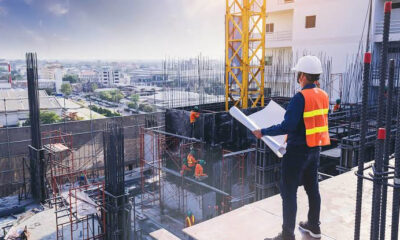Report
Flexible space market to cross 50 mn sq. ft. by 2023: JLL report


JLL on November 9 launched a report titled ‘Reimagine ‘Flexspaces: A 360⁰ view’ which highlights that the current market penetration of flex spaces into India’s total office stock stands at 3 per cent. The country, it said, is expected to witness deeper penetration, throughout 2021 and beyond and the flex space market is forecast to grow at a slower pace and more organically.
Irrespective of several short-term disruptions and challenges, increased demand from large enterprises, will support the growth of the flex space market to more than 50 mn sq. ft. by 2023. It is anticipated that flexible space will grow by an average of around 15-20 per cent per annum over the next three-to-four years, although this trajectory will not be linear.
Previously expected levels of new investment are unlikely to be seen, as operators look to solidify their existing operations and it is likely that certain operators will not be able to weather the storm.
“Flex space operators have changed the face of commercial real estate with their 

“Technology is advancing at an exponential pace and will play a major role in the future of workplaces. In this era, operators that utilise technology to enable the creation of a safer and better work experience will have a competitive edge” he added
As corporates return to the workplace, they are likely to further leverage flexible space to reduce capital expenditure and create cost savings, while allowing for split teams and de-densification requirements. Developments that initially drove the growth of the flex market, like the focus on utilising workplaces to boost productivity and drive dynamic work cultures, enhance emphasis on employee health etc., will continue to influence the next phase in India.


At present, Bengaluru and Delhi NCR together account for more than 50 pc of the flex space stock in India, with Bengaluru housing around 10.6 mn sq. ft. of such spaces. Hyderabad with 4.5 mn sq. ft. and Mumbai with 4.3 mn sq. ft. of flex office stock follow. According to JLL, Hyderabad and Pune are currently among the fastest-growing markets in the country.
In the commercial real estate space, flex spaces have become synonymous with adaptability. As preferences evolve, a range of flexible space options have taken shape to suit changing business needs, including remote working. To respond to the current disruption, and to lay the groundwork to deal with what may be permanent changes for the industry, flex space operators have been agile and are recalibrating their business strategies. They are now laying a greater emphasis on profitability and evolving strategies to ensure stable occupancy levels in their flex space centres.
Large enterprises to drive demand
The densification trend that had emerged over the last decade will likely reverse with enterprises leaning on flexible office space to relax space density. Large enterprises might also look at splitting up their offices to reduce commute times and dependence on public transport. However, with expected economic uncertainty, companies will be hesitant to commit large capital to real estate.
In terms of strategy, leasing directly to a third-party flexible space operator is the most widely adopted model. A partnership model allows both landlords and operators to leverage each other’s strengths. There are several ways to implement a partnership, with revenue shares and management contracts being the most common. Under the revenue share option, both parties split the upside. In the case of a management contract, the operator gets a fixed payment, while the landlord assumes all the leasing risk and enjoys the upside. Despite the benefits of this approach, partnerships are relatively less common in India for now.
What the future holds
The entry of more than 300 flex space operators into the country helped commoditize the market. Prior to the pandemic, most of these operators were focused on attaining scale and capturing market share. However, the availability of capital, in the current scenario, will be a challenge. Players who have embarked on aggressive growth so far will find themselves strapped for capital. In such a scenario, the market is likely to witness consolidation activity driven by larger operators with financial wherewithal acquiring smaller ones.
Flexible workplaces will continue to be a major influence on the future direction of the Indian office market. There will be an even greater focus on providing customized office space solutions and demand for flexible space will not only return but increase, as occupiers embrace the core plus flex model more widely. Despite the massive disruption from the impact of COVID-19, the future of flexible workspaces will remain optimistic.
-



 News4 weeks ago
News4 weeks agoKW Delhi 6 Mall Onboards New Brands
-



 News4 weeks ago
News4 weeks agoManasum Senior Living Launches IKIGAI GOA, A Senior Living Community in North Goa, in collaboration with Prescon Homes
-



 News4 weeks ago
News4 weeks agoBridging India Divide: Top 5 Tier- 2 Cities to Focus On
-



 News4 weeks ago
News4 weeks agoCommercial Realty Gets Tech Savvy: Fast Construction, Enhanced Convenience
-



 News3 weeks ago
News3 weeks agoGodrej Properties Sells Rs 3k cr+ Homes of Godrej Zenith, Gurugram, within 3 days
-



 News4 weeks ago
News4 weeks agoMultipoint Connection – A Definite Boon
-



 News3 weeks ago
News3 weeks agoRBI’s Status Quo on Key Policy Rates to Help Maintain the Real Estate Growth Momentum, Say Industry Stalwarts
-



 News2 weeks ago
News2 weeks agoOlive Announces Dhruv Kalro as Co-Founder



























